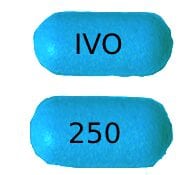Uses
Ivosidenib is used to treat a certain type of acute myeloid leukemia (AML; a type of cancer that begins in the white blood cells) that has returned or that has not improved after previous treatment(s). Ivosidenib is also used to treat a certain type of AML in some adults older than 75 years of age as a first treatment. Ivosidenib is in a class of medications cad IDH1 inhibitors. It works by slowing or stopping the growth of cancer cells.
Side Effects Of Ivosidenib
Ivosidenib may cause side effects. Tell your doctor if any of these symptoms are severe or do not go away:
- headache
- fatigue
- joint or muscle pain
- diarrhea
- constipation
- vomiting
- nausea
- loss of appetite
- mouth pain and ulcers
- stomach pain
Some side effects can be serious. If you experience any of these symptoms or those listed in the WARNING section, call your doctor immediately or get emergency medical treatment:
- dizziness, lightheadedness, or fainting
- weakness or tingling sensation in legs, arms, or upper body; numbness and pain on one side or both sides of the body; changes in your ability to see, touch, hear, or taste; burning or prickling sensation; or difficulty breathing
- chest pain
Ivosidenib may cause other side effects. Call your doctor if you have any unusual problems while taking this medication.
Warnings & Precautions
Before taking ivosidenib:
- tell your doctor and pharmacist if you are allergic to ivosidenib, any other medications, or any of the ingredients in ivosidenib tablets. Ask your pharmacist or check the Medication Guide for a list of the ingredients.
- tell your doctor and pharmacist what other prescription and nonprescription medications, vitamins, nutritional supplements, and herbal products you are taking or plan to take. Be sure to mention any of the following: amiodarone (Nexterone, Pacerone), carbamazepine (Equetro, Tegretol, Teril, others), clarithromycin, diltiazem (Cardizem, Cartia, Diltzac, Tiazac, others), efavirenz (Sustiva, in Atripla, in Symfi), erythromycin (Eryc), fluconazole (Diflucan), indinavir (Crixivan), itraconazole (Onmel, Sporanox, Tolsura), ketoconazole, oral contraceptives such as certain (‘birth control pills’), patches, and hormonal vaginal rings, nefazodone, nelfinavir (Viracept), nevirapine (Viramune), phenobarbital, phenytoin (Dilantin, Phenytek), pioglitazone (Actos), procainamide, quinidine (in Nuedexta), rifabutin (Mycobutin), rifampin (Rifadin, in Rifamate, in Rifater), ritonavir (Norvir, in Kaletra, in Viekira), saquinavir (Fortovase, Invirase), telithromycin (Ketek), and verapamil (Calan, Verelan, in Tarka). Your doctor may need to change the doses of your medications or monitor you carefully for side effects. Many other medications may also interact with ivosidenib, so be sure to tell your doctor about all the medications you are taking, even those that do not appear on this list.
- tell your doctor what herbal products you are taking, especially St. John’s Wort.
- tell your doctor if you or anyone in your family has or has ever had a prolonged QT interval (condition that increases the risk of developing an irregular heartbeat that may cause fainting or sudden death); if you have or have ever had a slow or irregular heartbeat or other heart problems; low blood levels of sodium, potassium, or magnesium; nervous system problems; liver disease, including cirrhosis; or if you are receiving dialysis treatments or if you have or ever had kidney disease.
- tell your doctor if you are pregnant or plan to become pregnant, or are breastfeeding. You should know that ivosidenib may decrease the effectiveness of hormonal contraceptives (birth control pills, patches, rings, or injections) while you are taking this medication. Talk to your doctor about using another form of birth control. If you become pregnant while taking ivosidenib, call your doctor immediately. Ivosidenib may cause fetal harm.
- tell your doctor if are breastfeeding. Do not breastfeed during your treatment with ivosidenib and for 1 month after your final dose.
Ivosidenib Dosage
Ivosidenib comes as a tablet to take by mouth. It is usually taken with or without food once daily. Do not take it with a high fat meal (such as fried foods or fast food). Take ivosidenib at around the same time every day. Follow the directions on your prescription label carefully, and ask your doctor or pharmacist to explain any part you do not understand. Take ivosidenib exactly as directed. Do not take more or less of it or take it more often than prescribed by your doctor.
Swallow the tablets whole; do not split, chew, or crush them.
If you vomit after taking ivosidenib, do not take another dose. Continue your regular dosing schedule.
Your doctor may reduce your dose or temporarily or permanently stop your treatment with ivosidenib depending on your response to treatment or any side effects that you experience. Talk to your doctor about how you are feeling during your treatment.
Ask your pharmacist or doctor for a copy of the manufacturer’s information for the patient.
Other
Your doctor will order a lab test before you begin your treatment to see whether your cancer can be treated with ivosidenib.
Do not let anyone else take your medication. Ask your pharmacist any questions you have about refilling your prescription.
It is important for you to keep a written list of all of the prescription and nonprescription (over-the-counter) medicines you are taking, as well as any products such as vitamins, minerals, or other dietary supplements. You should bring this list with you each time you visit a doctor or if you are admitted to a hospital. It is also important information to carry with you in case of emergencies.
Source
All information has been provided courtesy of MedLinePlus from the National Library of Medicine and from the FDA.



